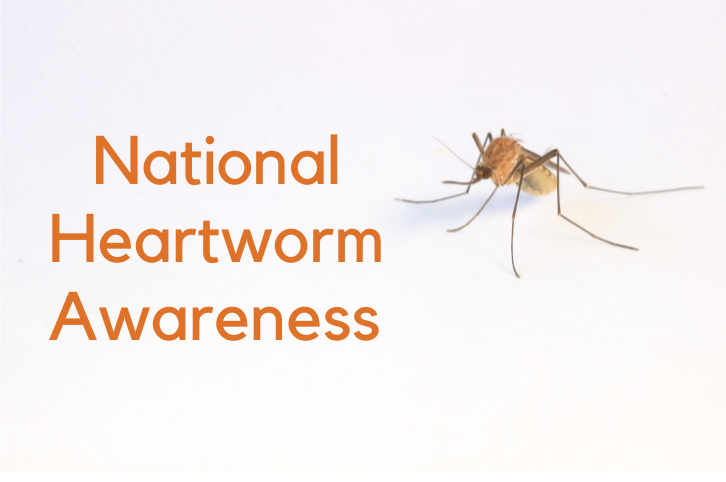Is your pet on heartworm preventative? Heartworm disease is a dangerous condition that affects cats, dogs, and ferrets. Caused by a blood-borne parasite, heartworm disease can cause significant damage to your pet’s heart and lungs and can be fatal. April is National Heartworm Awareness Month, and our team at Homey Gnome Veterinary Clinic is here to make sure your pet is protected.
In this article, we’ll discuss what you need to know about heartworm disease and what you can do to keep your pet safe.
What is Heartworm Disease?
Heartworm disease is caused by a blood-borne parasite known as Dirofilaria immitis. The parasite is found in dogs, foxes, coyotes, and wolves. However, it is spread by mosquitoes.
When a mosquito feeds on an infected animal, the mosquito picks up juvenile worms known as microfilariae. Over the course of 10-30 days, the microfilariae mature into larvae in the mosquito’s digestive tract. When they reach their infective stage, the larvae migrate to the mosquito’s mouthparts so that they can infect a new host.
If an infected mosquito bites your pet, the larvae enter your pet’s bloodstream and travel to the heart, lungs, and surrounding blood vessels. Over the next six months, the larvae will mature into adult worms and can grow up to a foot long.
Symptoms of heartworm disease can vary depending on the number of worms and the extent of the disease. Some common symptoms associated with heartworm disease include persistent cough, weight loss, decreased appetite, and exercise intolerance.
Diagnosis and Treatment
Heartworm disease is primarily diagnosed through blood testing. Your pet will receive a heartworm test as a part of their annual wellness exam. In some cases, additional testing may be necessary. X-rays and ultrasounds can also be used to diagnose and determine the extent of the disease.
Unfortunately, treating heartworm disease can be very challenging and expensive. Your pet’s treatment options will depend on their species and the extent of the disease.
For dogs with heartworm disease, there are medications and treatment protocols available. Our team can discuss these options with you and recommend an appropriate treatment plan for your pet. It’s essential to keep in mind that even with treatment, the damage caused by the worms can cause lasting effects on your dog’s heart and lungs.
Currently, there are no approved medications for treating heartworm disease in cats and ferrets. Treatment of these pets is limited to managing symptoms and preventing new infections.
Keeping Your Pet Protected
The best way to keep your pet protected is to make sure they are on heartworm prevention. Heartworm preventatives come in various forms, including oral chewables, topical treatments, and injectables.
Even though your pet’s risk of disease is significantly lower during the winter months, we recommend giving heartworm medication year-round. This will help keep your pet on a regular schedule and ensure they are protected when the mosquitos return.
Final Thoughts
At Homey Gnome Veterinary Clinic, keeping your pet healthy and heartworm free is our priority. If you have questions about your pet’s heartworm preventative or need to schedule an appointment, please give us a call at 651-202-3388.
For more information on heartworm disease and its impact on your pet’s health, you can also check out the American Heartworm Society.
We hope these tips will help keep your pet safe and heartworm free!
Image credit: Unsplash


